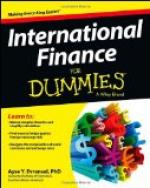Looking at the matter from a purely business point of view, we see that the great forward movement in trade and finance that we have led and fostered, has helped us even by helping our rivals. In the first place, it gives us a direct benefit as the owners of the mightiest fleet of merchant ships that the world has seen. We do nearly half the world’s carrying trade, and so have reason to rejoice when other nations send goods to the ports that we have opened. By our eminence in finance and the prestige of a bill of exchange drawn on London, we have also supplied the credit by which goods have been paid for in the country of their origin, and nursed until they have come to the land in which they are wanted, and even until the day when they have been turned into a finished product and passed into the hands of the final consumer. But there is also the indirect advantage that we gain, as a nation of producers and financiers, from the growing wealth of other nations. The more wealthy they grow, the more goods they produce want to sell to us, and they cannot sell to us unless they likewise buy from us. If we helped Germany to grow rich, we also helped her to become one of our best customers and so to help us to grow rich. Trade is nothing but an exchange of goods and services. Other countries are not so philanthropic as to kill our trade by making us presents of their products and from the strictly economic point of view, it pays us to see all the world, which is our market, a thriving hive of industry eager to sell us as as it can. It may be that as other countries, with the help of our capital and example, develop industries in which we have been pre-eminent, they may force us to supply them with services of which we are less proud to be the producers. If, for example, the Americans




